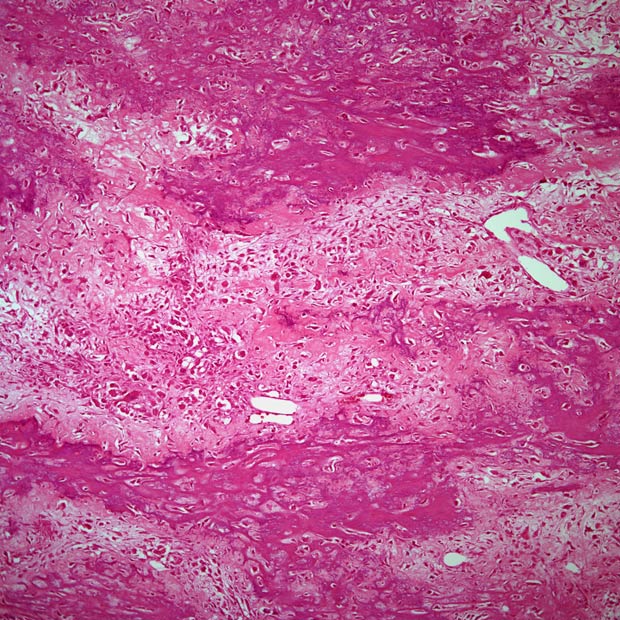Cabozantinib Combo Yields Disease Control in Metastatic Soft Tissue Sarcoma
Cabozantinib plus nivolumab and ipilimumab appears to improve progression-free survival vs cabozantinib alone among patients with metastatic soft-tissue sarcoma in a phase 2 trial.
"Correlative work is ongoing, and updated response data will be presented soon," according to an expert from Washington University School of Medicine.

A treatment regimen consisting of nivolumab (Opdivo) plus ipilimumab (Yervoy) and cabozantinib (Cabometyx) yielded improvements in progression-free survival (PFS) and disease-control rate (DCR) compared with cabozantinib in the treatment of patients with metastatic soft tissue sarcoma, according to findings from a phase 2 trial (NCT04551430) presented at the 2023 American Society of Clinical Oncology (ASCO) Annual Meeting.
“The combination of cabozantinib with PD-1 and CTLA4 inhibition has been studied in other solid tumors and has been shown to be safe in phase 1 studies,” study author, Brian Van Tine, MD, PhD, Professor of Medicine, Division of Oncology, Section of Medical Oncology, Washington University School of Medicine, said while presenting the findings.
Patients in the trial were randomized 2:1 to receive cabozantinib (40 mg, daily) plus ipilimumab (1mg/kg) and nivolumab (3mg/kg) for 4 doses Q3W and then maintenance nivolumab at 480g Q4W (n=69) or 60 mg of cabozantinib alone (n=36). The trial design allowed for crossover, and 19 patients crossed over to the triplet arm after disease progression.
To be eligible for the trial, patients needed to have an ECOG score of 0-1; have undergone 1-2 prior lines of therapy; and be diagnosed with sarcomas that lack translocations. Median age was 59 (range, 35-77) and 61 (range, 19-77) in the triplet and single-agent arms, respectively. On average, patients had 1.7 (range, 1-4) and 1.5 (range, 1-3) prior therapies, respectively among the two groups.
Regarding tumor subtype, 39 and 19 patients in the triplet and single-agent arms, respectively, had a diagnosis of leiomyosarcoma; 2 and 1 patient had dedifferentiated liposarcoma; 2 and 3 patients had undifferentiated pleomorphic sarcoma; and 26 and 13 patients had a disease histology classified as “other.”
There was no statistically significant difference in response rates between the two arms.They were 11% in the immunotherapy-containing arm, which included 5 partial responses (PR) and 2 complete responses (CR); and 6% in the cabozantinib-only arm, including 2 PR, 0 CR (p= not significant).
“What becomes interesting is the crossover arm — it's allowed after RECIST (-determined) progression — we added ipilimumab and nivolumab and we had an additional 2 PRs in leiomyosarcoma,” Van Tine explained.
Patients who responded to the cabozantinib/nivolumab/ipilimumab regimen had angiosarcoma, epitheliod sarcoma, and myxofibrosarcoma. Both patients who responded to cabozantinib had leiomyosarcoma.
The average PFS for the 4-drug group was 5.4 months, compared to 3.8 months in the cabozantinib-only arm (p=0.016).
DCR for the cabozantinib/nivolumab/ipilimumab arm was 80%, including 41 patients who had stable disease, and then the 5 partial and 2 complete responses. Meanwhile, in the Cabometyx group, the disease control rate was 42%, including 11 stable disease and 2 partial responses (p=0.0004).
The most common grade 3-4 adverse events affecting 10% or more of patients in the three-drug group included hypothyroidism, diarrhea, mucositis, oral dysesthesia, nausea, vomiting, elevated AST and ALT, anorexia, dysgeusia, headache, pruritis, maculopapular rash, and hypertension. For the cabozantinib-only arm, common grade 3-4 adverse events were hypothyroidism, diarrhea, oral dysesthesia, fatigue, palmar-plantar erythrodysesthesia, and hypertension.
“Correlative work is ongoing, and updated response data will be presented soon,” Van Tine concluded.
Reference
Van Tine B, Eulo V, Toeniskoetter J, et. al. Randomized phase II trial of cabozantinib combined with PD-1 and CTLA-4 inhibition versus cabozantinib in metastatic soft tissuesarcoma. Presented at: 2023 ASCO Annual Meeting. June 2-6, 2023. Chicago
Belzutifan Improves PFS Across Subgroups for Advanced ccRCC
July 12th 2024“In LITESPARK-005, PFS and response rates favored belzutifan vs everolimus across [several patient subgroups, including] IMDC risk, number of prior lines [of therapy], and number of prior VEGF TKIs, specifically,” said Laurence Albiges, MD, PhD.